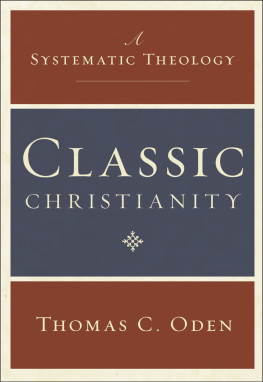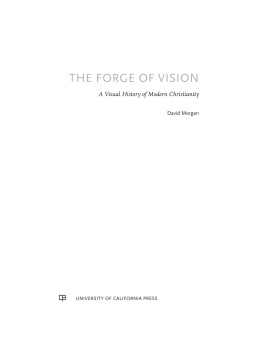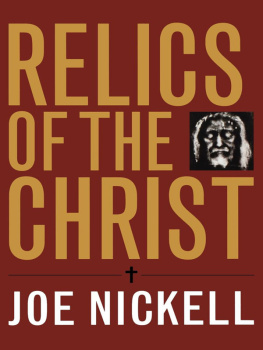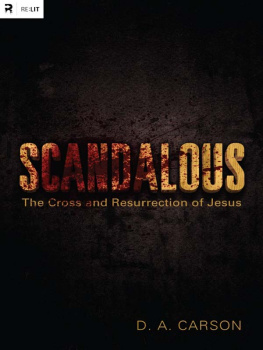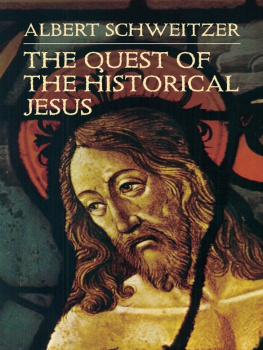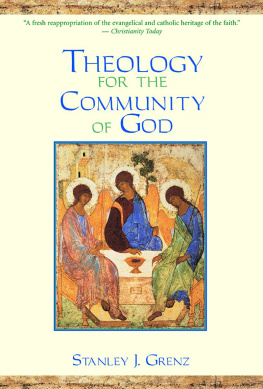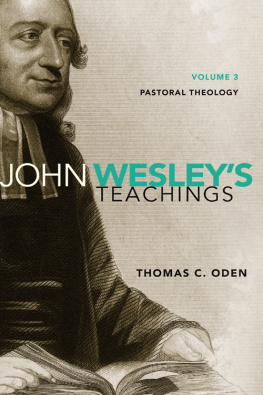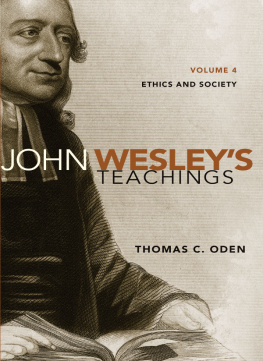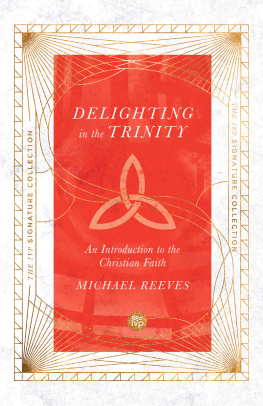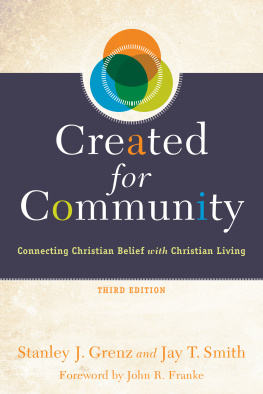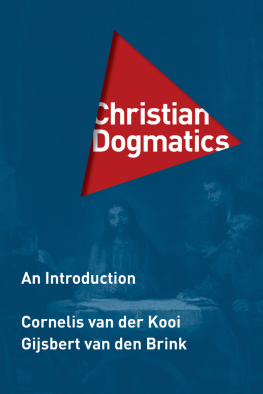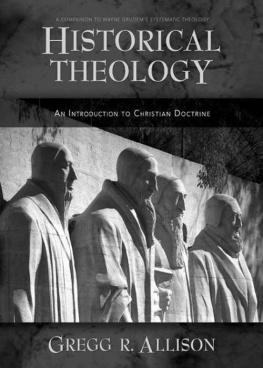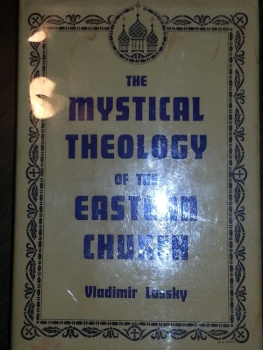Thomas C. Oden
Contents
Getting Started
The Living God
The Living God
The Name of God
The Nature of God
The Character of God
The Reality of God
Whether God Exists
Whether God Is Triune
The Work of God
God the Creator and Creation
Gods Care for the World
The Study of God
Whether God Can Be Studied
The Word of Life
Why Christ?
Word Made Flesh
The Body Language of God
Divine Sonship
The Incarnation
The Manner of Gods Coming
One PersonTruly God, Truly Human
Our Lords Earthly Life
The Proclaimer Proclaimed
The Public Ministry of Jesus
The Work He Came to Do
He Died for Our Sins
The Death of Jesus
In Our Place
Exalted Lord
Christus Victor
The Risen Lord
Ascension and Session
Life in the Spirit
The Person of the Holy Spirit
The Person of the Holy Spirit
The Work of the Spirit
Salvation
The Way of Repentanc
Justification by Grace Through Faith
Baptism of the Spirit
Union with Christ and Sanctification
The Church
The Community of Celebration
Marks of the Church
Human Destiny
Last Things: Death and Personal Survival
The End of Human History
The Communion of Saints and the Life Everlasting
General Consent of the Laity as the Principle of Legitimacy
On Theo-Comic Perception
GETTING STARTED
My basic purpose is to set forth an ordered view of the faith of the Christian community upon which there has generally been substantial agreement between the traditions of East and West, including Catholic, Protestant, and Orthodox. My intent is not to present the views of a particular branch of modern Christian teaching, such as Roman Catholic or Reformed, but to listen single-mindedly for the voice of that deeper consensus that has been gratefully celebrated as received teaching by believers of vastly different cultural settings, whether African or Asian, Eastern or Western, sixth or sixteenth century.
My intention may be simply put: I hope to set forth what is most commonly stated in the central Christian tradition concerning God. This effort is therefore ecumenical in a larger sense than is usually assumed in the modern ecumenical movement. It proposes to follow that ancient ecumenical consensus of Christian teaching of God as seen in earliest creedal summaries of Irenaeus, c. AD 190; Tertullian, c. 200; Hippolytus, c. 215; Council of Caesarea, 325; Council of Nicaea, 325; Marcellus, 340; Cyril of Jerusalem, 350; Council of Constantinople, 381; Rufinus, 404; Council of Chalcedon, 451. These confessions still embrace and empower not only centrist Protestants and traditional Roman Catholics and Orthodox but also great numbers of evangelicals, liberals, and charismatics.
Hence I am seeking to set forth key constructive arguments of two millennia of ecumenical Christian thinking that God is, who God is, and what that means for us today. I seek an internally consistent statement of classical Christian thinking about God so as to provide a reliable foundation for baptism, the life of prayer, scripture studies, and for the living of Christian life.
No attempt has been made to avoid the classical language of the church. The study of God does better by letting tested classical Christian language speak for itself in its own directly powerful way to modern minds and hearts wrestling with the limits and failures of modern consciousness. The faithful have no dread of using the traditional language of the church. Terms like incarnation and resurrection need to be explained, not avoided.
Contemporary cultures present no tougher challenges to Christianity than did the fall of Rome, the collapse of the medieval synthesis, the breakup of the unity of Christendom in the sixteenth century, or the French Enlightenment. Christian teaching today must be pursued amid a similar collapse of modern assumptions. I will not try to offer classic Christianity artificial crutches to assist it in catching up with the frenzied pace of modernity. My premise is that modernity has more catching up to do with classic Christianity. My passion is in the closest possible adherence to the texts of classic Christian teaching.
Modest Reaffirmations
In reworking the earlier three-volume edition (198792) into a single volume, I reaffirm solemn commitments made at its beginning:
- to make no new contribution to theology
- to resist the temptation to quote modern writers less schooled in the whole counsel of God than the best ancient classic exegetes
- to seek quite simply to express the one mind of the believing church that has been always attentive to that apostolic teaching to which consent has been given by Christian believers everywhere, always, and by all. This is what I mean by the Vincentian method (Vincent of Lrins, Commonitory ).
I have listened closely for the historic ecumenical consensus received by believers of widely varied languages, social locations, and cultures, whether of East or West, African, or Asian, whether expressed by women or men of the second or first Christian millennium, whether European or decisively pre-European, post- or pre-Constantinian.
My goal has not been to survey the bewildering varieties of dissent, but to identify and plausibly set forth the cohesive central tradition of general lay consent to apostolic teaching, seen not through its centrifugal aberations but in its centripetal centering. I will spend little time trying to knock down others cherished views. The focus is upon setting forth plausible layers of argument traditionally employed while presenting in connected order the most commonly held points of biblical teaching as classically interpreted by the leading teachers of the earliest centuries of Christianity.
My intention is not to try to satisfy the finicky appetites of naturalistic skeptics who will always remain hungry. Nor is it to find a clever way of making the way of salvation conveniently acceptable to the prejudices of modernity. I am pledged not to become fixated upon the ever-spawning species of current critical opinions, but instead to focus single-mindedly upon early consensual assent to apostolic teaching of how God the Spirit works to fulfill the mission of God the Son on behalf of God the Father.
I do not assume that my reader already affirms classic Christian teaching. I wish only to give a fair hearing to the way in which classical Christian teachers have always understood their own grounding and empowerment.
I will not dodge or explain away the time-honored vocabulary of the church, or seek constantly to substitute diluted terms congenial to modernity. The witness to Gods saving action is best served by letting the tested language of the Christian tradition, as refined through countless historical and political mutations, speak for itself out of its own power to modern minds struggling with the follies and limits of modernity. Only those who give traditional Christianity a fair hearing can fairly decide whether it makes sense. Deteriorating modern ideologies must now catch up with the ever-new forgings of classic Christianity, not the other way around.

